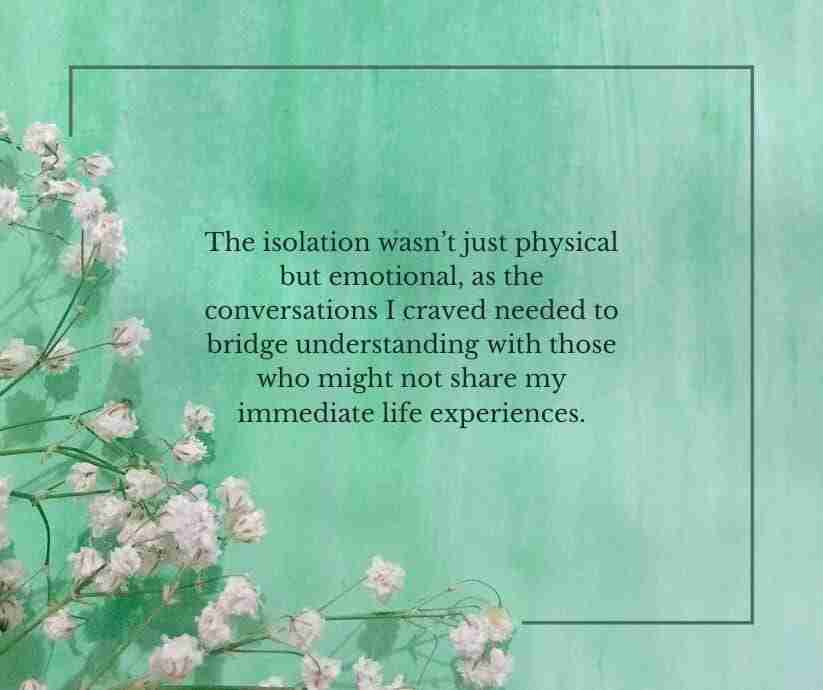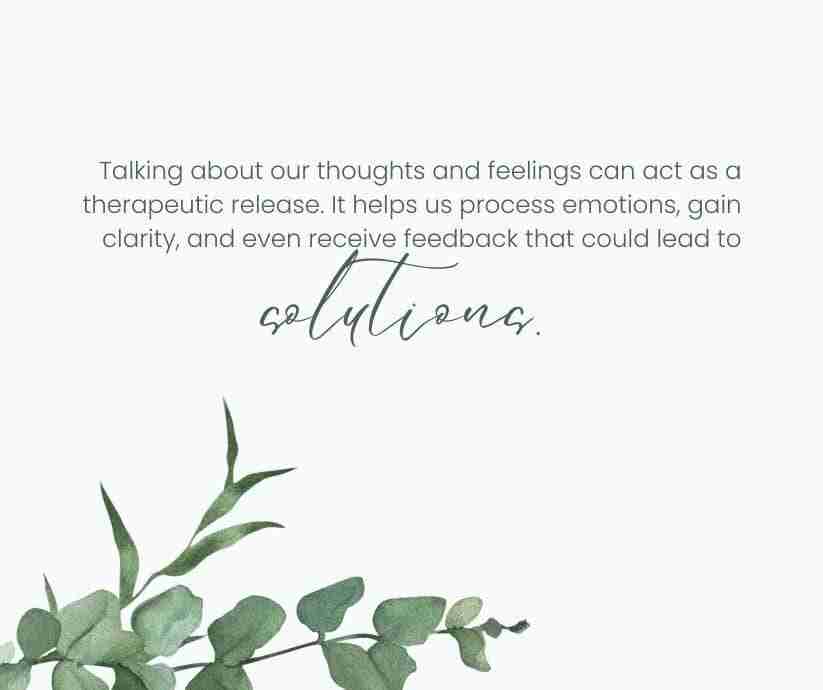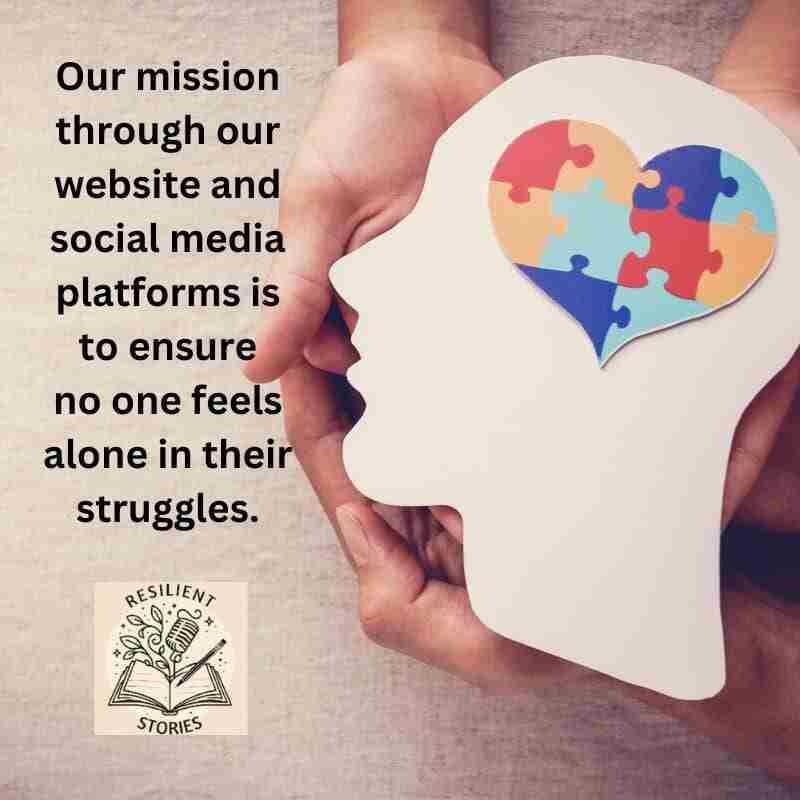Life’s journey brings with it many complex emotions and challenging situations. From childhood through adulthood, the phases of our lives bring different challenges and needs for communication and support. There have been many moments in my life where I needed to talk to someone.
During tough times, having someone to talk to can provide significant emotional relief and a fresh perspective.
Whether you’re grappling with stress, mental health struggles, or just need to share your thoughts, reaching out for a conversation is a healthy step toward managing your emotions.
There are various options for talking to someone, drawing on both professional resources and personal anecdotes, and addressing common questions about finding support.
The Changing Faces of Need: How to Talk to Someone
As a Child and Teen: Even as a young child, the need to express feelings and thoughts is crucial. For me, the early years were filled with moments of silent confusion and emotional turbulence that I couldn’t always articulate.
As a teenager, this need transformed into a quest for identity and belonging, where talking sometimes felt like the only way to anchor myself in the sea of social expectations and personal insecurities.
As a Young Mother and Wife Attending College: Entering adulthood brought its own set of challenges. Being a young mother and wife while attending college placed me in a unique situation—away from the typical experiences of my peers, which often left me feeling out of sync.
The isolation wasn’t just physical but emotional, as the conversations I craved needed to bridge understanding with those who might not share my immediate life experiences.

As a Working Professional Facing Layoff: Later, as a working professional juggling family responsibilities, the stakes changed yet again. Suddenly getting laid off brought a profound sense of uncertainty and stress.
This period underscored the importance of having a support system. It highlighted how crucial professional networks and emotional support can be in navigating the waters of change and maintaining one’s mental health.
Why We Need to Talk
Any situation can spark the desire or necessity to talk—feeling misunderstood as a child, isolated as a young parent in an academic setting, or vulnerable as an employee facing job loss.
Each phase of life presents its own set of challenges and triumphs, and talking about these experiences is not just about seeking solutions.
It’s about feeling heard, validated, and supported while learning to navigate the emotional landscapes of different life stages. We can find solace in shared experiences and expert guidance.
Whether it’s a need for emotional clarity, crisis intervention, or simple companionship, the act of talking has profound implications for our mental health and well-being.
Understanding the Value of Conversation in Human Behavior
Talking about our thoughts and feelings can act as a therapeutic release. It helps us process emotions, gain clarity, and even receive feedback that could lead to solutions. My personal journey with anxiety taught me the value of hearing a different perspective.

This simple act often lightens the emotional load and makes challenges seem more manageable. Reflecting on a particularly tough day as a young mother juggling college courses, I remember feeling overwhelmed.
A conversation with a fellow student in a similar situation helped me feel less alone and more capable of handling my responsibilities.
During my time as a working professional, regular discussions with a mentor provided me invaluable insights into navigating workplace challenges and personal growth.
These conversations, though sometimes casual, played a critical role in developing my coping strategies and resilience.
It’s experiences like these that inspired the foundation of ResilientStories, where we believe in the power of sharing and hearing others’ experiences to foster a supportive community.
Our mission through our website and social media platforms is to ensure no one feels alone in their struggles.

Conversations can be a powerful tool in developing coping skills for managing emotional distress and mental health challenges, offering a way to learn and apply strategies that help navigate life’s obstacles more effectively.
Where to Find Someone To Talk To For Free
Many people wonder, “Where can I talk to someone for free?” or “Is there someone I can talk to for free?” Fortunately, there are several options:
Crisis Text Line, crisis line, and other crisis lines provide immediate access to trained listeners via text, a perfect anonymous avenue for immediate support in mental health emergencies.
Support groups, both online and offline, can offer a sense of community without any cost.
These groups bring together people facing similar issues, which can provide comfort and decrease feelings of loneliness. Participating in a support group helped me realize that my experiences were not unique and that sharing them could be mutually healing.
National Suicide Prevention Lifeline and other crisis hotlines offer free, confidential help from trained counselors. They are not only for life-threatening situations but also for any moment of emotional distress.
Each of these resources offers not just a listening ear but also practical advice and emotional solidarity.
Whether you’re facing a moment of crisis or simply need to talk about everyday stresses, these avenues will help you find someone to talk to, ensuring that no one has to face challenging times alone.
Through ResilientStories, we strive to amplify these personal narratives, creating a platform where stories of resilience can resonate, inspire, and offer hope, reinforcing the importance of community in our collective journey to mental well-being.

Exploring Mental Health Professionals and Peer Support
When navigating the complexities of mental health, the different options we choose can significantly influence our journey toward healing and stability. Professional support from a trained counselor and peer support from groups each offer unique benefits.
Mental health professionals bring a wealth of expertise and therapeutic techniques that can help diagnose, treat, and manage mental health conditions effectively.
On the other hand, peer support groups provide a platform for understanding through shared experiences, creating a community that empathizes deeply with each other’s situations.
In my own experiences, particularly when navigating periods of depression, both forms of support proved invaluable.
Therapy provided me with strategic tools to address my mental health clinically and pragmatically. At the same time, peer groups can provide support and the reassurance that while you may feel lonely, you are not alone.

Finding the Right Support Network
Building a robust support network is crucial for anyone facing mental health challenges. This network can vary widely from person to person but typically includes:
Mental health professionals, who provide tailored advice and therapy that addresses specific mental health needs.
Friends and family, who offer emotional comfort and practical help in day-to-day life. Their support can be especially comforting, providing a touchstone of normalcy and love during tough times.
It’s important to recognize the unique role family members play in offering emotional support and understanding. However, it’s also crucial to seek help from trained professionals when the challenges exceed what your best friend and family can address.
Online therapy platforms connect individuals with an online therapist. These platforms often offer more flexibility and can be a lower-cost alternative to traditional therapy sessions, making mental health support more accessible to those who need it.
When I was a young mother and student, finding time and helpful resources to access traditional therapy was challenging.
Online therapy was not as prevalent in the early 2000s, so I utilized the school’s mental health services often. If you are in college
Dealing with Immediate Needs
Immediate emotional needs, especially when you need someone to talk to, can often feel the most pressing and overwhelming.
Questions like “What do I do if I just need to talk to someone?” or “Who can I call if I just want to talk?” highlight the urgent need for accessible conversation for those seeking emotional support, venting, or discussing mental health concerns.
Here are a few strategies that can provide immediate relief:
Reach out to friends or family: Sometimes, simply talking to someone you trust can provide immense relief. A familiar voice can offer both comfort and perspective, helping to lighten the emotional load.
Use apps and websites designed for immediate emotional support, such as 7 Cups. These platforms provide free, anonymous conversations with trained listeners, making it easier to find support anytime you need it.
Dial a crisis line: If you’re feeling overwhelmed and need guidance quickly, helplines staffed by trained counselors can offer immediate advice and emotional support. They are there to help you through crisis moments, providing a crucial safety net in times of acute distress.
Integrating these immediate solutions with the broader support of a network that includes both professionals and peers creates a comprehensive approach to managing mental health.
This synergy ensures that whether the need is immediate or ongoing, there are multiple layers of support available, helping to build resilience and promote long-term well-being.
Addressing Loneliness and Isolation Will Help With Depression and Anxiety

Loneliness can deeply impact our mental health, intensifying feelings of sadness and isolation. It can stem from various sources, such as physical separation from others, emotional barriers, or life transitions that disrupt our usual social routines.
Despite the challenges it presents, reaching out and forging connections can be incredibly rewarding and therapeutic.
During my early days as a young mother attending college, I often felt disconnected from my peers who were navigating different life stages.
This isolation was both physical, due to my busy schedule, and emotional, stemming from my unique pressures and responsibilities.
Eventually, I sought out opportunities to meet parents facing similar challenges. These interactions were vital in reducing my feelings of isolation, providing both emotional support and practical parenting tips.
Resources for Combating Loneliness And Learning to Cope
Community Centers and Local Events: These venues are fantastic for meeting new people. They will help you connect and create networks to help you overcome loneliness.
Online Forums and Social Media Groups: The digital world offers a plethora of opportunities to meet like-minded individuals or those experiencing similar life situations.
Participating in online forums and social media groups can bring a sense of belonging and community, no matter where you are located. Follow us on our social media and discover shared struggles and find comfort.
By actively seeking out these resources, whether in person or online, you can alleviate the feelings of loneliness and build a supportive network that resonates with your experiences.
These connections not only enrich your social life but also provide emotional support that can help navigate the challenges of loneliness and isolation.
Leveraging Technology for A Safe Space Online
In today’s digital age, technology has transformed the landscape of mental health support, creating new pathways to find emotional relief and professional guidance.
The advent of online therapy, forums, and chat apps has revolutionized how we seek and receive help, making it more accessible and sometimes less intimidating than traditional face-to-face sessions.
Platforms like BetterHelp and Talkspace allow you to schedule sessions during times that are your routine without the need for commuting or arranging childcare.
This flexibility is crucial in maintaining consistent support, helping me navigate through stressful times without compromising my responsibilities at home or work.
Moreover, integrating technology into mental health services has made it easier for individuals to access immediate support and connect with therapists, counselors, and support groups tailored to their specific needs, ensuring that help is always within reach.

Practical Tips for Talking to Someone
When you decide to reach out, knowing how to initiate and navigate the conversation can significantly impact the effectiveness of the dialogue. Here are some practical tips to help make the process smoother and more fruitful:
Be honest and direct about your feelings and what you’re going through: Articulating your emotions and experiences can sometimes be challenging, but honesty opens the door to genuine support and understanding.
During a particularly low period, I found that simply stating, “I’m really struggling today,” invited much-needed compassion and assistance from my support network.
Ask open-ended questions if you’re engaging with someone else about their experiences: This approach encourages a more meaningful exchange and shows that you value their thoughts and feelings.
Questions like “What has your experience been like?” or “How have you been coping?” can prompt deeper insights and foster a supportive dialogue.
Listen actively, showing genuine interest and empathy in the conversation: Active listening involves more than just hearing words; it’s about understanding the underlying emotions and responding thoughtfully.
This can be as simple as nodding in acknowledgment, paraphrasing what the speaker has said, or offering verbal affirmations like “That sounds really challenging,” to validate their experiences.
Offering Support and Listening When People Want to Chat Is Helpful
Whether you’re struggling with a mental health issue, facing personal crises, or simply feeling the need to connect, remember that talking can be incredibly beneficial.
Conversations can act as a bridge to understanding, relief, and action.
From free resources like crisis hotlines and online forums to professional therapy and personal networks, numerous options are available to support you.
By reaching out, you take an essential step toward healing and finding balance in your life. Engaging effectively in these conversations can open pathways to a happier, healthier life.
Remember, it’s okay to seek help, and actively seeking the right support is a sign of strength and a proactive step toward well-being. And if you find yourself on the listening end, give someone the benefit of your safe space and compassion.
Tell us about a time when you needed someone to talk to in the comment section.



























This gave me tips on how to be a better listener and I will put this to use in my role as a supervisor.
Thank you! There was so much good information in there that can be used in so many different kinds of situations!
Keep up the great work….it is important that we as a society support each other mentally/emotionally
Thanks so much for your kind words! We couldn’t agree more and appreciate your support!
Great article.
Thanks so much for leaving a comment! We hope you take a moment and enjoy some of the other inspirational content on the site.